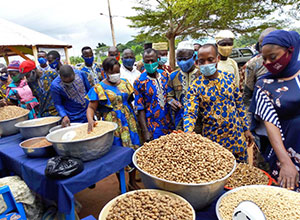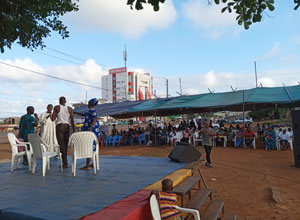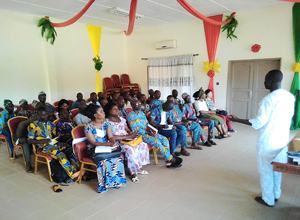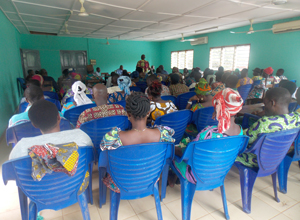30 Oct. 2017 Benin
New learning materials for literacy education in Fon language to be published periodically.
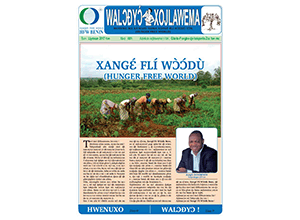
It consists of 8 pages of A4 size paper. With more than 13,000 characters, it provides substantial volume of reading.
Knowledge on nutrition and food can be acquired while learning reading and writing.
More than 800 people have finished the literacy education course, which has been offered by HFW since 2004. It is reported that approximately 100 people who took the literacy education course are acting for the development of the region by teaching the literacy classes or by becoming facilitators of HFW projects. During the school years of 2016 and 2017, 179 people were enrolled in beginner and intermediate classes, and 110 passed the final evaluation test held in July. We will keep to follow them up to learn literacy to those who failed carefully.
We have made a new program for the new classes that start in the middle of November, so that people can learn not only the three R’s but also get knowledge on nutrition, sanitation and health. The themes to be dealt with are “the right to food”, nutritiously balanced meals, highly nutritious local food materials, food security and access to land, sanitation of housing, food, clothing and environment, childbirth intervals, and income generating activities etc. Further, we decided to make an information booklet that can be used as learning materials in the local language Fon. Professionals are giving idea on the above mentioned themes and co-authoring with writers and translators of Fon. The Governor of Zé County that has the jurisdiction over the village of Gbeto, our activity region, contributed to the first edition, and he emphasized the importance of literacy education, and encouraged people in the region to make use of this information booklet. It is planned that the Governor will explain the complicated land system of Benin plainly in the future editions.
500 free booklets will be published in every three months. They are not only to be used as learning materials for literacy education but also to be delivered to residents, leaders, other NGO’s working on literacy education, the Ministry of Education etc. We are expecting that this free booklets help people to spread out the knowledge of their living life working together with government. Free delivery is planned until it gets more popular in the region, but its self-managed publication and sales at a reasonable price are also within our view.
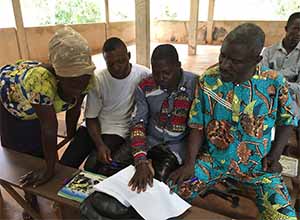
HFW staff and teachers review the contents of the booklet very carefully as to whether the theme is appropriate, or it is easy to understand etc.
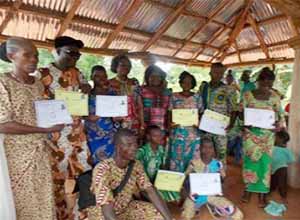
In the completion ceremony held in September, completion certificates were handed. The chief of the ward also attended the ceremony.
Message from Benin

The baseline survey of this time conducted by HFW clarified the problems in the area regarding nutrition and sanitation. I think it is very important to review the contents of the literacy program according to the results of the survey, and also feel much motivated to draw up a new program. I believe the number of mal-nourished children could be decreased by delivering necessary information to the local people.
I have been working on rural development and literacy education activities for the past 30 years. This is because I want to contribute to the local people to get knowledge to improve their own life. Motivated teachers are involved in HFW’s literacy program. I appreciate that they are working so hard for the community. Training opportunities are essential part for them to accomplish important roles as teachers. Their skills would be strengthened more if we can give them chance to learn new knowledge and more effective teaching methods, and to repeatedly put them into practice day by day.
Literacy program professional Mr. Zossou Andre

The content of the new literacy program is very important to improve the nutrition conditions of mothers and children. I believe that we can change the situation in three years if we keep on working on this program. I have been teaching in the literacy class since 2008, hoping that I would be able to be a model for women of the village. Women role is very important in every family. They constantly pay attention to what happens around them, and also takes responsible for taking care of children. It is women who buy food and necessary goods, such as medicine, with the money that husband erned. It is very important for women to acquire necessary knowledge and skills to take these roles.
I have been observing who have finished the literacy class. For instance, and I saw they can became caluculate and control money much better than before. Also they became more careful about sanination, using the knowledge and skills that they learned in the class. I hope that the new program will help them to acquire correct knowledge and guidance for their behavior regarding nutrition so that they can protect children’s health.
Literacy class teacher Ms. Ester Kemayon

